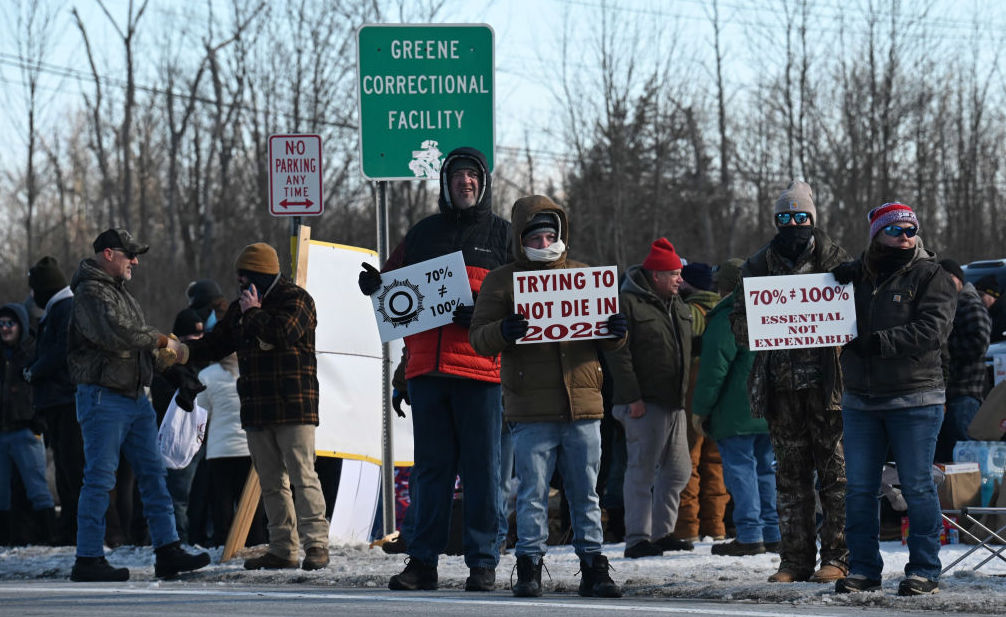Officers are calling for the HALT Act to be repealed. The law went into effect in 2022 and mandates what proponents say are “more humane alternatives” to solitary confinement while also limiting which inmates can be placed in solitary at all.
Supporters of the officers say the HALT Act hasn’t worked and has made prisons unsafe, not only for officers but for inmates and other workers, like nurses, social workers, maintenance staff, and more.
They’ve cited DOCCS stats, arguing that there’s been a 169% increase in inmate-on-inmate assault, a 76% rise in inmate-on-staff assault, and a 32% bump in contraband cases since the HALT Act was implemented.
Most officers will not speak to the media out of fear of retribution, but there are retired officers participating in protests and expressing their former colleagues’ frustrations. For example, Suzanne Furman, a recently retired sergeant,
Democratic Governor Kathy Hochul is threatening New York state correction officers who are striking over unsafe working conditions with arrests if they do not return to their jobs.
Following a rise in violent incidents inside state prisons — which officers say is due to Democratic prison reform measures — correction officers and sergeants from two NY prisons started to protest and strike last Monday. The movement has since swelled in support, and now thousands of officers and sergeants from more than 30 prisons across the state are participating.
Hochul reacted by suing the officers, which ultimately led to her administration directing state troopers to serve papers on striking officers.
“State troopers began serving judicial orders on striking correction officers over the weekend that threatened they could be arrested if they do not show up to court this week and subsequently return to work,” the Times Union reports. “The service of the court orders is the first step in enforcing a temporary restraining order issued by a state Supreme Court justice in Erie County in a ruling that found the workers who began striking on February 17 are violating New York’s Taylor Law governing public employees that prohibits job walkouts.”
Additionally, Hochul has moved to stop paying for health insurance coverage for those striking. They’ll now have to cover their entire share of their health insurance premium, which can be hundreds to thousands of dollars more a month. If an officer can’t cover it, their insurance will be canceled.
Officers say the strike is a long overdue reaction to Hochul — and before her, Democratic Governor Andrew Cuomo — ignoring their complaints about safety and mandated work shifts that can sometimes exceed 48 hours at a time, according to a statement from New York Congresswoman, Elise Stefanik.
In the days leading up to the strike, officials locked down the Collins Correctional Facility in Erie County due to an inmate uprising. There was also a memo circulated by the Department of Corrections and Community Supervision (DOCCS) “advising prison superintendents that 70% of DOCCS’ original staffing model is the new 100%.”
Notably, those on strike do not have the support of the New York State Correctional Officers and Police Benevolent Association (NYSCOPBA), which is the government-affiliated union for correctional officers, making the strike a “wildcat strike.”
Will Waldron/Albany Times Union via Getty Images
Officers are calling for the HALT Act to be repealed. The law went into effect in 2022 and mandates what proponents say are “more humane alternatives” to solitary confinement while also limiting which inmates can be placed in solitary at all.
Supporters of the officers say the HALT Act hasn’t worked and has made prisons unsafe, not only for officers but for inmates and other workers, like nurses, social workers, maintenance staff, and more.
They’ve cited DOCCS stats, arguing that there’s been a 169% increase in inmate-on-inmate assault, a 76% rise in inmate-on-staff assault, and a 32% bump in contraband cases since the HALT Act was implemented.
Most officers will not speak to the media out of fear of retribution, but there are retired officers participating in protests and expressing their former colleagues’ frustrations. For example, Suzanne Furman, a recently retired sergeant, told CBS, “You go to work and you don’t know if you’re gonna go home, and that’s a true statement. The general public does not know how dangerous this job has become.”
There are also message boards for officers, and some people are speaking out there. A woman named Sarah Tompkins said that while she was working at Green Haven Correctional Facility last year, an inmate tackled her to the floor and ripped out her hair. She provided photos of her injuries and said the inmate was only hit with harassment in the second degree, which is a violation, not a crime.
A male officer also shared photos of his injuries from the job and wrote, “I got punch[ed] in the face 3 times in a 30 day span.”
Republican state Senator Pamala Helming said earlier this month that a female officer at Groveland Correctional Facility was sitting at her desk when an inmate attacked her; she was choked, punched, and kicked in the face and body.
Mediation between both sides began on Monday, with a reported offer from DOCCS for two times the hourly rate for overtime, the nixing of the controversial staffing reduction memo, and the suspension of certain provisions in the HALT Act.

